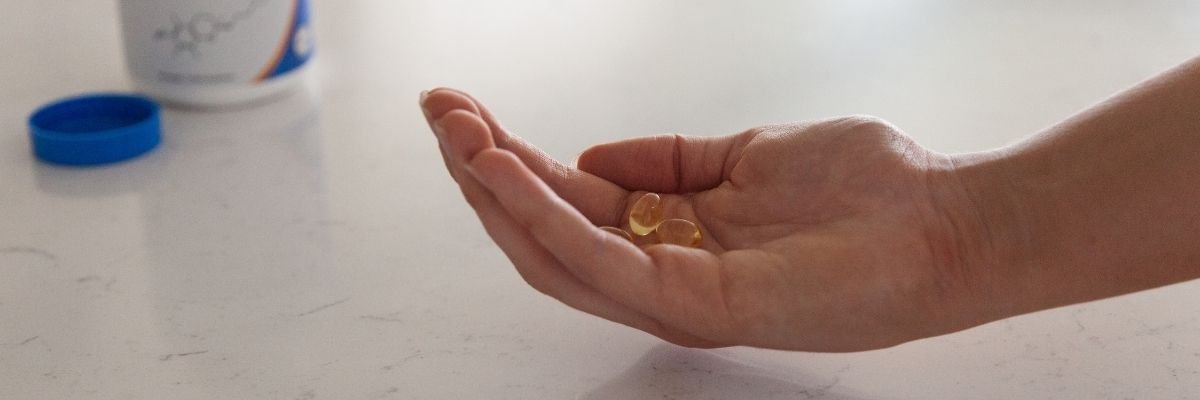What is Vitamin E and Why You Might Not Be Getting Enough of It

What is Vitamin E?
Vitamin E is a nutrient and antioxidant which is important to vision, reproduction, and the health of your brain, skin, and cardiovascular system. Vitamin E appears in eight different variants, only one of which is active in humans. For this reason, it’s common for labels to refer to Vitamin E by its chemical name, alpha-tocopherol.
While your body does produce its own stores of Vitamin E, certain factors can make supplementation an option worth considering.

Where Can I Get My Vitamin E?
Most Vitamin E is absorbed as part of a regular diet, and natural sources are easy to find. Here’s a short list of some common foods rich in Vitamin E.
- Sunflower seeds
- Peanuts
- Spinach
- Peanut butter
- Almonds
- Hazelnuts
- Broccoli
Vitamin E can even be found in some fruits, such as kiwi, mango, and tomato!

Recently, Vitamin E supplements have begun to gain a reputation, with many using them for their properties as antioxidants as well as for skin and hair care. But what is all this about? Is a Vitamin E supplement right for you?
This article explores Vitamin E, breaking down its chemical function within the body and expounding on some of its most common uses.
Let’s get to it!
What is an Antioxidant?
You may have heard that Vitamin E is an antioxidant, but what does that mean? Well, before you understand antioxidants, you have to know about free radicals.
Free radicals are troublemaking molecules that go around destabilizing your cells by stealing electrons. This forcible electron removal is known as oxidation, and if that word sounds familiar, it’s because it’s the same chemical process which rusts metal. Yikes.
Free radicals—sometimes referred to as Reactive Oxygen Species (ROS) are byproducts of natural body processes such as digestion and exercise, but they can also be created by exposure to harmful environmental factors such as air pollution, UV rays, and tobacco smoke. Eating large amounts of heavily processed foods may also contribute to excess free radicals.
So. What does this have to do with antioxidants? Antioxidants, such as Vitamin E, are like little crime fighters. They neutralize free radicals and prevent them from wreaking havok on your cells. Your body produces its own antioxidants, but it is possible for these efforts to be outmatched by the production of free radicals.
What Effects Do Free Radicals Have on Your Body?
For the most part, your body maintains a natural balance between its production of free radicals and antioxidant defenses. However, as stated before, certain factors—some environmental, some lifestyle based—can result in increased numbers of free radicals in the body. If your body is unable to keep up with the production of free radicals, it can enter a state of Oxidative Stress.
Oxidative stress refers simply to an imbalance between free radicals and antioxidants which skews heavily in favor of free radicals. Outnumbered, your body’s heroic force of antioxidants is left with nothing to do but allow for some of these mischievous free radicals to slip through the cracks.
Such an imbalance may have damaging effects on such things as:
- Skin
- Cardiovascular health
- Eyesight
- Cognitive capacity
Additionally, some studies suggest possible links to several types of cancer as well.
Is Vitamin E Good for Your Hair and Skin?
Due to its moisturizing properties, it is common these days to see Vitamin E used as an ingredient in skin creams and oils. Rejuvenating face masks are also available, and Vitamin E supplements have become a popular way of treating scar tissue from acne or other sources.
Vitamin E is also commonly used as an overnight skin treatment. Because of their thickness, Vitamin E creams are commonly applied before bed so as not to interfere with makeup or other serums used during the day.

How Much Vitamin E Should I Take?
According to the National Institute of Health, the Recommended Dietary Allowance (RDA) of Vitamin E for individuals over the age of 14 is 15mg. For nursing women, that number rises to 19mg.
As with all dietary supplements, care must be taken to keep use within healthy boundaries. There is most certainly such a thing as “too much of a good thing.” Thankfully, these guidelines have been clearly established by organizations such as the National Institute of Health which has set the Tolerable Upper Intake Levels for Vitamin E at:
- 9-13 years: 600mg
- 14-18 years: 800mg
- 19+ years: 1000mg

Wrapping Up
“Vitamin E” is the collective name for a group of fat-soluble compounds with distinctive antioxidant properties which combat rampaging free radicals in the body.
In addition to being an antioxidant, Vitamin E is an essential nutrient for many cells and assists in several biological functions. Numerous foods provide Vitamin E. Nuts, seeds, and vegetable oils are among the best sources but supplementation may be worth considering if your lifestyle or environment tends to include certain, free-radical producing factors.
Sources
https://pubmed.ncbi.nlm.nih.gov/8479463/
https://pubmed.ncbi.nlm.nih.gov/8209876/
https://ods.od.nih.gov/factsheets/VitaminE-HealthProfessional/
https://www.ncbi.nlm.nih.gov/pmc/articles/PMC3249911/
https://www.hsph.harvard.edu/nutritionsource/vitamin-e/
https://www.healthline.com/health/vitamin-e-for-face#overnight-treatment
https://www.mayoclinic.org/drugs-supplements-vitamin-e/art-20364144
-
Posted in
Antioxidants, Skin Health, Vitamins










